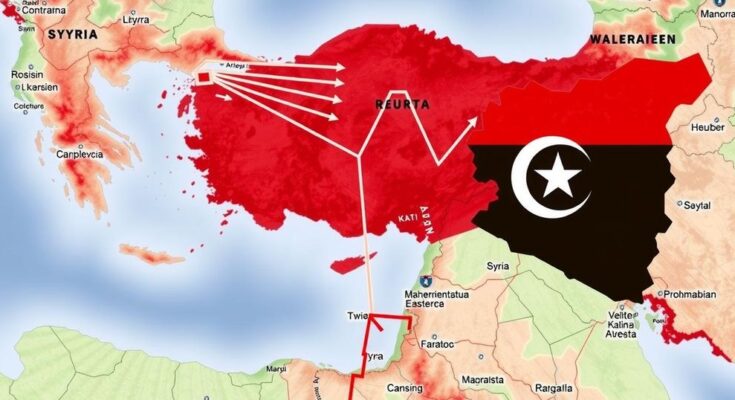Analysts are considering the possibility of Russia redeploying military forces from Syria to Libya, driven by the need to maintain a strategic presence along the Mediterranean and in Africa. The evolution of the conflict in Syria poses challenges for Russia’s military infrastructure, potentially prompting a shift in focus to Libya, where geopolitical dynamics are complex, particularly concerning local power struggles and Western responses.
Analysts are currently contemplating the possibility of Russia’s military shifting focus from Syria to Libya following its reevaluation of strategic interests in the region. Despite the loss of dominant control over Syria having minimal material impact on Moscow, maintaining a strategic presence in the Mediterranean and Africa remains crucial for the Kremlin. Since 2017, the expansion of Russia’s influence in Africa through engagements in both Syria and Libya has been a priority for Russian planners.
During the Syrian conflict, Russia played a pivotal role in bolstering Bashar al-Assad’s regime and established significant military infrastructure including an air base at Khmeimim and the expansion of the Tartous naval base. However, with the current situation in Syria shifting and the future of these bases uncertain, a potential redeployment of military assets to Libya is acknowledged as an alternative. Libya, where Russia already holds a presence, could serve as a strategic foothold, particularly for exerting influence into Europe.
Russia’s military endeavors in Africa have been managed chiefly through the Africa Corps (formerly the Wagner Group), which supports governments in countries like Mali and Burkina Faso that have distanced themselves from Western alliances. Analysts note that while Western influence is waning in Africa, countries such as China and Turkey are becoming increasingly prominent, compelling Russia to solidify its positions as a means to compete effectively.
The situation in Libya is further complicated by the ongoing power struggle between the rival governments, led by Khalifa Haftar in the east and the international community-recognized Government of National Accord in the west. The potential establishment of a Russian military hub in eastern Libya could reinforce Haftar’s negotiating power, which might destabilize efforts aimed at resolving Libya’s political deadlock. This precarious balance of power raises concerns about how Russia’s increased military presence would affect the region and the response from Western nations, especially as Haftar has frequently been viewed as a Russian proxy.
The geopolitical implications of Russia’s moves cannot be overstated. Libya’s unique geographical position allows it to serve as a point of leverage for Russia against NATO’s interests in Europe. Western outreach to Haftar further complicates the dynamics, as it seeks to mitigate the challenges posed by both migratory flows and potential Russian influence. As analysts remark, the developments in Libya warrant close scrutiny given the implications for regional stability and international interests.
In recent years, Russia’s military engagement in Syria has been a focal point of its strategic operations, particularly through efforts to support the Assad regime. The importance of maintaining military bases in Syria has been emphasized as a vital part of Russia’s influence in the Mediterranean. As the Syrian conflict evolves and the future of Russian bases becomes uncertain, analysts suggest that Libya is a logical pivot point for the Kremlin, with growing military aspirations aimed at enhancing influence across North Africa and into Europe. The interplay of power between Russia, local factions in Libya, and Western nations provides a complex backdrop to potential future developments in the region.
In summary, the potential redeployment of Russian military forces from Syria to Libya highlights significant geopolitical maneuvers affecting not only local regimes but also the broader balance of power in the Mediterranean and beyond. The ongoing tumult in Libya may be exacerbated by increased Russian involvement, particularly if it strengthens Khalifa Haftar’s dominance. As the West contemplates its own strategies in response, the implications for durable peace in Libya and the region at large remain critical areas for international focus and concern.
Original Source: www.aljazeera.com




